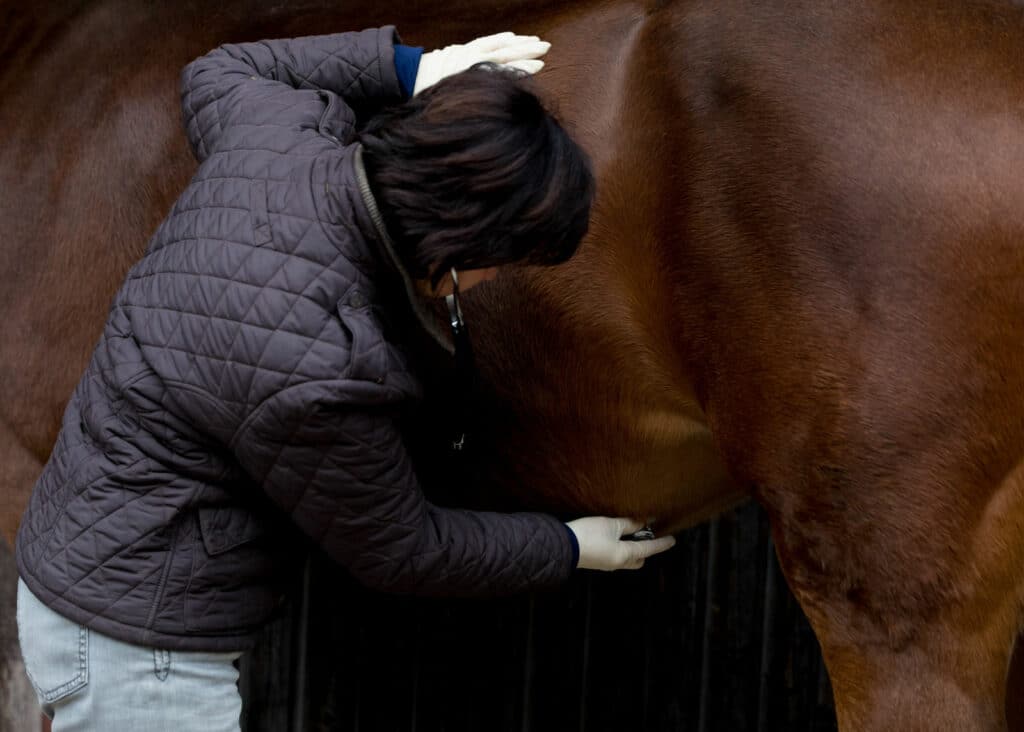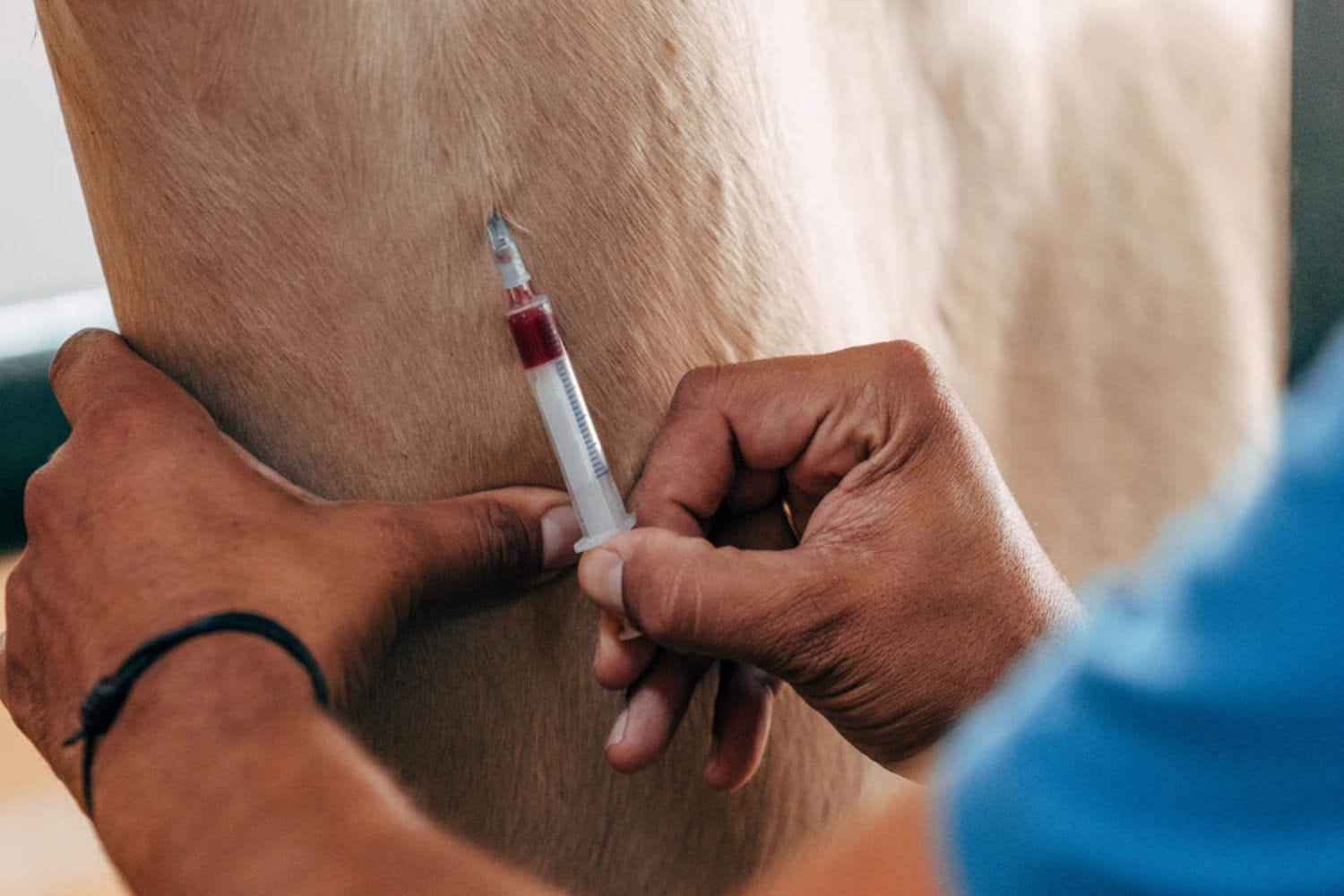In recent years, horse owners have become all too familiar with gastric ulcers and the standard diagnostic tools and treatments used to address this condition. While these ulcers are a common cause of gastrointestinal discomfort in horses, veterinarians are starting to recognize the significance of widespread digestive issues found beyond the stomach.
Enteritis and other disorders that affect your horse’s intestines are more challenging to identify, but a correct diagnosis and treatment plan are critical for your horse’s health. Keep reading to learn more about this serious condition and how you can support your horse’s entire GI tract.
Introduction to Enteritis in Horses
Enteritis is the inflammation of the small intestine. While most commonly associated with bacterial infection, Enteritis often involves both non-infectious and infectious diseases. (Page et al., 2014.)
Enteritis is of particular concern for vets and horse owners alike because of the severe symptoms that can be associated with this gastrointestinal disorder. Common clinical signs include significant abdominal pain that may present like colic. (Archer et al., 2014.) This pain can suddenly appear with other clinical signs, including fever, increased heart rate, and severe gastric reflux.
Left untreated, enteritis can progress rapidly and become life-threatening. Horses with enteritis may suffer from dehydration and the release of toxins, and excessive gastric reflux must be removed to prevent rupture.
Diagnosing Enteritis in Horses
The clinical signs of enteritis are often confused for general colic symptoms. However, other causes of these symptoms include intestinal torsion or blockage, which require surgery, so an accurate diagnosis is critical.
Unfortunately, the small intestine is problematic for your vet to evaluate as it is long and convoluted. It cannot be viewed through endoscopy and is inaccessible from outside the body. In many cases, vets can only make a presumptive diagnosis of enteritis based on risk factors, history, and examination. (Schumacher & Legere, 2018.)
Step 1: Horse Characteristics
Age is an important consideration when you suspect your horse may be suffering from enteritis. Different types of enteritis affect different age groups. For example, while young foals are more susceptible to bacterial infections, older horses frequently experience enteritis due to abnormal tissue growth.
Step 2: History and Clinical Signs
Enteritis often occurs acutely after bacterial or viral infections as typical colic symptoms. Additional clinical signs include intestinal distention, lethargy, lack of appetite, increased heart rate, rapid respiration, and discoloration of the mucous membranes.
Non-infectious enteritis may have a chronic presentation associated with weight loss, diarrhea, and edema.
Step 3: Clinical Evaluation
A thorough examination can rule out inadequate nutrition, inappropriate feeding, intestinal worm infestations, or other organ dysfunctions. Additional tests should include complete blood cell counts, urinalysis, serum biochemical profiles, and fecal analysis.
Additional Steps
Further diagnostic tools could include abdominocentesis to evaluate free fluid in the abdominal cavity, abdominal ultrasound, gastroscopy, rectal biopsy, or PCR analysis. Exploratory surgery is the best way to view the small intestine, but this procedure is highly invasive and requires intensive aftercare. (Schumacher, 2009.)
Support Diagnosis With a Fecal Blood Test
Fecal occult blood tests are a valuable tool for evaluating the health of the entire equine GI tract. This non-invasive and affordable test can support the diagnosis of suspected enteritis or identify overlooked digestive issues and guide additional diagnostics.
The SUCCEED FBT is a diagnostic aid for veterinarians that detects the presence of the blood proteins albumin and hemoglobin in a fecal sample. When taken together, the presence or absence of these proteins may indicate the location of significant GI tract problems.
While the FBT is highly sensitive, it cannot confirm a specific disorder. However, it can help your vet distinguish between enteritis or colitis as potential causes of diarrhea. Ask your vet to test your horse if you suspect enteritis or other GI tract conditions, or as part of a wellness exam to support early detection.
Treatment and Prevention
Being proactive about managing your horse’s GI health is the best way to limit the risk of serious digestive conditions. However, performance horses are often at risk of digestive challenges even with the best care and nutrition. If your horse is diagnosed with enteritis, immediate treatment is necessary.
Treatment Options
Treatment can vary depending on the type of enteritis. Viral causes of infectious enteritis generally only require symptomatic treatment, while antibiotics are necessary for enteritis caused by bacterial infection. (Pusterla et al., 2018.) Non-infectious enteritis can be more complicated to treat.
Owners should also focus on providing supportive care for the complications associated with any type of enteritis. Supportive care may include:
- Electrolyte replacement and fluid therapy
- Intravenous plasma or colloidal therapy for low levels of protein in the blood
- Vitamin and mineral supplementation
- IV nutrition for horses with an inability to tolerate food
- Gastric ulcer treatment
Minimize Risk With Management
The specific diseases associated with enteritis are not entirely preventable as some horses have a higher risk than others. But identifying risk factors and minimizing their impact on your horse can help reduce the occurrence of enteritis.
The demands of training and competition, stall confinement, infrequent meals, and limited access to forage can all contribute to the digestive challenges in performance horses. When dietary changes aren’t practical, supporting optimal GI health with nutritional supplements can help minimize risk.
Look for products that offer prebiotic nutrients like beta-glucan to promote a healthy microbial population in the hindgut. Amino acids like glutamine, threonine, and arginine can also support mucous production and strengthen the gut barrier. (McNeil & Ito, 1989.)
Ask Your Veterinarian About SUCCEED FBT
Enteritis is a severe digestive problem in horses that can range from an acute condition requiring immediate care to a chronic disease that causes low-grade discomfort for months. No matter the specific cause of enteritis, accurate diagnosis and swift treatment is vital.
Thankfully, good management practices can help keep your horse’s gut comfortable. And when your horse seems off, new diagnostic tools allow veterinarians to understand better what’s really going on. Stay proactive about your horse’s gi tract health and ask your vet to test your horse with the SUCCEED FBT if you suspect enteritis or have other GI wellness concerns.
References
- Archer, D.C., Costain, D.A. and Sherlock, C., 2014. Idiopathic focal eosinophilic enteritis (IFEE), an emerging cause of abdominal pain in horses: the effect of age, time and geographical location on risk. PloS one, 9(12), p.e112072.
- McNeil, P.L., Ito, S., 1989. Gastrointestinal cell plasma membrane wounding and resealing in vivo. Gastroenterology. 96(5 Pt 1), pp.1238-48.
- Page, A.E., Slovis, N.M. and Horohov, D.W., 2014. Lawsonia intracellularis and equine proliferative enteropathy. Veterinary Clinics: Equine Practice, 30(3), pp.641-58.
- Pusterla, N., Vin, R., Leutenegger, C.M., Mittel, L.D. and Divers, T.J., 2018. Enteric coronavirus infection in adult horses. The Veterinary Journal, 231, pp.13-18.
- Schumacher, J., 2009. Idiopathic Focal Eosinophilic Enteritis. In N.E. Robinson and K.A. Sprayberry, ed., Current therapy in equine medicine. Elsevier Health Sciences pp.440-41.
- Schumacher, J. and Legere, R., 2018. Eosinophilic intestinal diseases of the horse. Equine Veterinary Education, 30(9), pp.472-74.




